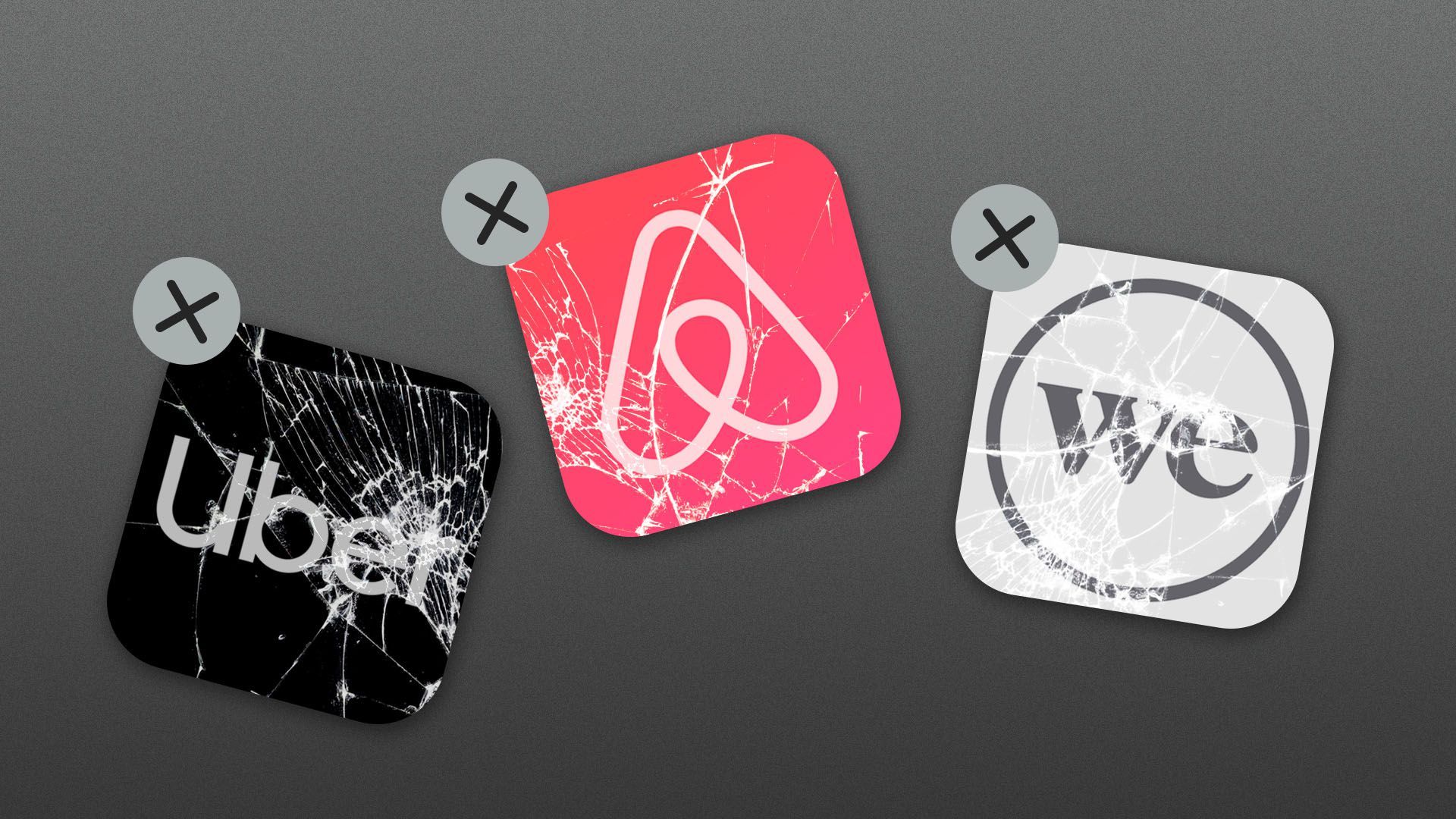Pandemic flattens the sharing economy
Add Axios as your preferred source to
see more of our stories on Google.

Illustration: Sarah Grillo/Axios
The "sharing economy" — as embodied by companies like Uber, Airbnb, and WeWork — is in critical condition, thanks to the coronavirus pandemic.
Why it matters: Basic assumptions about the evolution of human behavior in the digital age are melting under the pressure of COVID-19, requiring us to recalibrate how we envision the tech-enabled future.
Driving the news:
- Ride-hailing giants Uber and Lyft saw their business crater with the pandemic's arrival, according to analysts. Yesterday, the Information reported Uber was weighing layoffs of up to 20% of its 27,000 employees.
- Airbnb has added new cleaning protocols and 24-hour between-stay buffers. The privately held company hasn't disclosed how its business is faring, but it took on two separate $1 billion loans earlier in April.
- WeWork, which packs large numbers of workers from multiple companies into its teeming co-working spaces, was already in trouble before the coronavirus hit, and now it's trying to figure out how to make its "members" feel comfortable enough to return to their pods.
The pandemic has brutally shut down these companies' fundamental bets.
- Right now Americans simply aren't leaving home much, and when they do, they will drive in their own cars if that's an option. (They may still prefer ride-hailing to mass transit, or be left with no other option in places where transit routes have been drastically cut back.)
- Minimal travel means little demand for short-term rentals. And thanks to work-from-home orders, there's little demand for co-working space.
The big picture: The sharing economy — an idealistic vision birthed and branded in the late 2000s, during the last economic crisis — held that Americans were moving beyond an ethos of acquiring and protecting stuff.
- Instead, we would willingly share use and enjoyment of space, vehicles, and tools, saving money to buy memorable experiences and fulfilling leisure activities.
- Software could make this possible by widely distributing access to information about the availability of those spaces, vehicles and tools, and by building reputation ratings and "trust proxies" to put us at ease with relying on strangers.
- In the early days of the Web, Americans got comfortable using their credit cards online and selling used appliances on eBay. Sharing-economy entrepreneurs aimed to extend that approach everywhere.
- As a 2014 Wired cover story put it, "We are entrusting complete strangers with our most valuable possessions, our personal experiences — and our very lives. In the process, we are entering a new era of Internet-enabled intimacy."
Yes, but: The companies that emerged to deploy this vision in American cities, driven by a startup ideology of "scaling fast" and enriching investors, turned it into something faster and nastier — a grinding gig economy with a flashy app front-end.
- The billion-dollar sharing giants were all about squeezing new efficiencies out of existing human and material assets, and then trying to squeeze a profit from fees on the margins.
- That was always a tough business proposition: Uber and Lyft, which are both now publicly traded, have never turned a profit.
- Now, even if these firms bounce back in the post-lockdown world, they've lost all room to maneuver.
What's next: In some ways, the pandemic opens a door to the revival of the sharing economy's original, grassroots ideals of community cooperation and peer-to-peer trust.
- There's a lot of flour, sugar and yeast passing from neighbor to neighbor these days, even if we're just leaving it on one another's doorsteps.
- We may not rush back into shared spaces — but we've experienced a profound demonstration of interdependence.
Editor's note: This story has been corrected to report that Uber has 27,000 employees — not 2,700, as we originally said.
